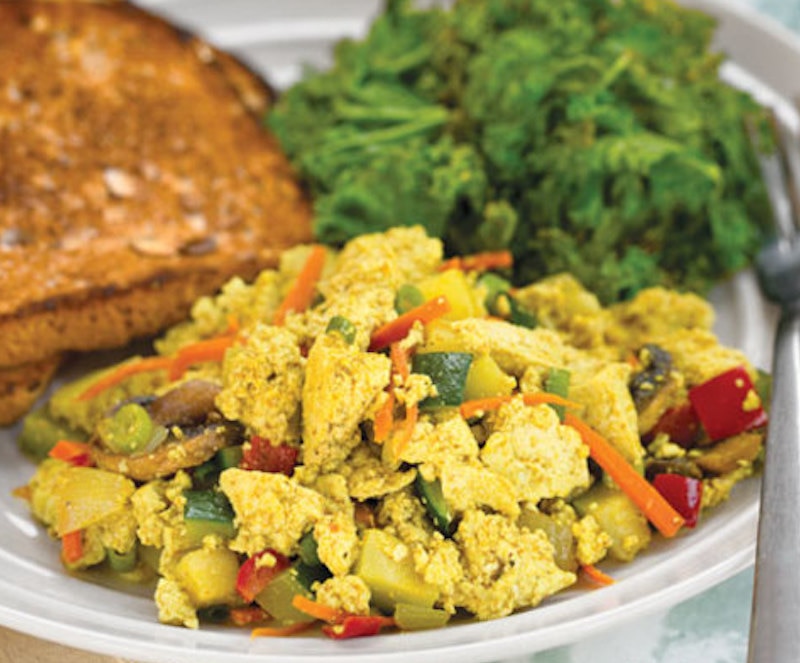
Most Americans are getting it wrong.
According to a new survey by the Physicians Committee for Responsible Medicine (PCRM) and Morning Consult, more than 60 percent of US adults mistakenly believe eating plant-based is more expensive than a diet that includes meat and dairy. The misconception is especially strong among Baby Boomers, with 67 percent saying a plant-based diet costs more than the Standard American Diet.
But while grocery prices continue to climb, what people are actually spending the most on is meat. The same survey, which polled 2,206 adults in June 2025, found that 77 percent of respondents believe food costs are too high.
 Adobe Stock
Adobe Stock
When asked what item consumes most of their grocery budget, 70 percent pointed to meat. It’s not just perception. Data from Pew Research Center confirms it: meat, poultry, fish, and eggs have seen the sharpest inflation of any food category since January 2020, with prices up more than 36 percent.
And yet, the foods that offer the best value, highest nutritional return, and even long-term health savings are sitting quietly in the pantry section: beans, lentils, tofu, grains, and vegetables. “Meals built around whole or minimally processed plant foods—like beans, grains, tofu, and vegetables—are often far more affordable than meals centered on animal products like meat and dairy,” Xavier Toledo, a registered dietitian with PCRM, said in a statement. “Centering a plant-based diet on whole, minimally processed foods is one of the most effective ways to not only nourish your body, but also cut grocery costs.”
Plant-based food is cheaper, and it’s backed by data
PCRM research published in JAMA Network Open in 2024 put this into hard numbers. When compared to a Standard American Diet that includes meat and dairy, a low-fat vegan diet cut food costs by 19 percent, or about $1.80 per day.
 Canva
Canva
The largest savings came from reducing meat ($2.90 per day), dairy ($0.50), and added fats (another $0.50). And while costs for vegetables (up $0.50), grains ($0.30), and meat alternatives ($0.50) increased, those were offset entirely—plus some.
Annualized, that’s more than $650 in savings for someone eating a whole-food, plant-based diet over someone following the average American eating pattern. Compare that to someone on a Mediterranean diet, and the savings jump to $900 a year.
“A vegan diet won’t just save money; it could save lives by helping to avoid or improve conditions like obesity, type 2 diabetes, and heart disease,” says Hana Kahleova, MD, PhD, one of the study’s lead authors.
Oxford University came to a similar conclusion in 2021. According to its modeling, switching to a vegan diet could cut a household’s food bill by up to one-third. A separate 2022 analysis found that people eating plant-based spend less on food than any other group.
What about protein?
Despite persistent myths, plant-based staples pack in plenty of protein, the researchers noted. Beans, lentils, tofu, oats, whole grains, and even vegetables like broccoli and spinach all contribute to meeting daily protein needs.
Toledo says that for budget-conscious eaters, it’s as much about strategy as it is about ingredients. Buy produce in season. Stock up on frozen or canned vegetables when they’re more affordable. Cook in big batches. Build your meals around filling, protein-rich pantry items like potatoes, chickpeas, and brown rice. “These strategies add up—helping you save money without shortchanging your health,” he says.
Need proof? Here’s what a high-protein, plant-based day of eating looks like for less than the cost of a typical fast-food combo meal.
Start your morning with a hearty tofu scramble: one block of extra-firm tofu plus garlic, onion, bell peppers, mushrooms, and a handful of spices makes four servings at just $1.70 each. Compared to eggs—which have been subject to price spikes and shortages in recent years—it’s a high-protein, fiber-rich, and affordable option that doesn’t rely on cholesterol-laden animal products.
For lunch or dinner, a protein-packed three-bean chili hits all the marks: canned or cooked black beans, kidney beans, and chickpeas, plus celery, onions, bell pepper, diced tomatoes, tomato sauce, olive oil, and spices. Each serving comes in around $1.75. It’s dense with fiber, rich in flavor, and proof that plant-based cooking doesn’t mean missing out on heartiness.
And for a meal-prepped dinner (or next day lunch), chickpea burgers are hard to beat. Chickpeas, oats, carrots, garlic, sun-dried tomatoes, tahini, and a mix of pantry spices are pulsed into patties and served on whole-wheat buns. The result? Ten servings at just $1.05 per burger. It’s a bold contrast to the rising cost of beef—and the saturated fat that comes with it.
The real cost of eating well
These meals don’t just save money at checkout—they’re also linked to better health outcomes, PCRM says. Multiple studies show plant-based diets can help manage weight, reduce the risk of cardiovascular disease, lower cholesterol, improve insulin sensitivity, and reduce risk for type 2 diabetes and certain cancers. In fact, a 2023 trial found that people following a low-fat vegan diet saw more improvements in body weight, body composition, and cholesterol levels than those on a Mediterranean diet.
 Juan Bautizta | Studio Mexico
Juan Bautizta | Studio Mexico
And while public awareness is slowly shifting—one recent PCRM survey found that half of US adults now acknowledge the health benefits of plant-based eating—there’s still a knowledge gap. Only one in five primary care doctors routinely discuss it with their patients. That’s starting to change. More than 130 physicians recently urged the federal Dietary Guidelines Advisory Committee to prioritize legumes—including beans, peas, and lentils—as a key protein group in the upcoming 2025 Dietary Guidelines for Americans.
The public might not yet realize it, but the numbers don’t lie. The cheapest, most nutrient-dense, high-protein diet isn’t packed with steak or protein bars—it’s built on simple, plant-based staples that deliver real nutrition at a fraction of the cost. And it might just be sitting in your pantry already. “The benefits don’t stop at saving money,” says Toledo. “A plant-based diet can support weight management and help prevent—and in some cases even reverse—lifestyle-related diseases like heart disease, obesity, and type 2 diabetes. The diet can also reduce risk for certain cancers. And it doesn’t hurt that plant-based eating can taste amazing, too!”
This post was originally published on VegNews.com.
